12 Things You Should Know Before Attending A Cooking Class
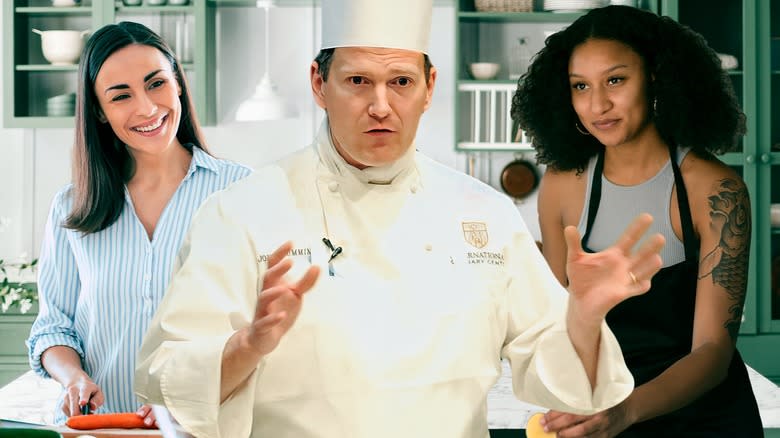
For many cooks, receiving a chef's kiss may be the ultimate reward for a fine dining experience. But not every meal is a guaranteed hit. On the surface, it might make sense to up your game by signing up for a cooking class. Getting that extra insider tip on how to perfect your signature dish might just be all it takes to get that scowling food critic -- whether than be a reluctant Michelin reviewer, a wary spouse, or your own fussy kids -- to pucker up with love and gratitude.
A cooking class can be fun, but there are pitfalls that can make prepping a dish seem like cramming for a dreaded high school presentation. An instructor who might need to recapture the joy of cooking, classes that cram students into kitchens like sardines, or, after it's all over, receiving a bill for a customized apron that breaks the piggy bank might give any prospective student pause. Before signing up for a cooking class, do some light research to make sure you're a good fit with the program. That way, when the pressure's up and the heat is on, you'll still be in your element in the kitchen.
Read more: 15 Best Knife Brands, Ranked
Make Sure The Class Is Affordable

Perhaps the first and foremost issue is the class's price. Cooking courses range from free to over six figures for a fine dining masterclass with a Michelin chef. You definitely don't want to break the bank just to learn how to turn on the stove, so do some research on how the class is set up before signing up.
One way to start is to ask yourself why you want to go to a particular class or school. Are you jump-starting a career, or are you just looking to spice up the dinner table for the holidays? If you're hoping to enter a prestigious culinary school, a local community college can cover the basics and allow you to build up academic credit without breaking the bank.
You might also want to see what that price tag covers. If the course runs into three digits, consider any amenities that might be included. Some classes provide ingredients, aprons, utensils, and cookware, while others also provide food tours and more personalized experiences. See if the program is already set, or, if you're angling for a particular theme or dish, see if you can customize your own menu. And, of course, make sure you can take home what you made to wow the folks back home.
Know The Format And Structure
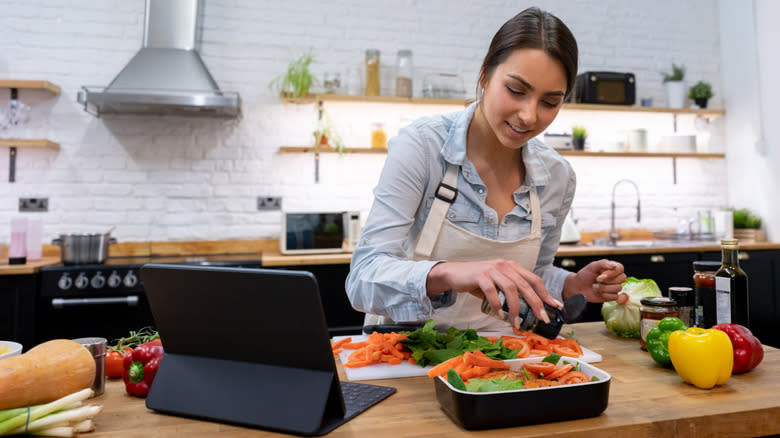
Cooking classes come in all formats and sizes. Some cooking classes are one-on-one, while others seem more like a college course. If you miss a class or fall behind, some classes might send you that day's recipe and lessons, but otherwise, catching up when the class moves on might be hard. If you have a busy schedule that overflows into your free time, or you know that you'll be heading on a vacation in the middle of the course, it might be best to wait until your calendar clears up a bit.
One way to accommodate a class is to check out a cooking class mobile app, one of the fastest-growing food trends. Many apps are designed for users with hectic routines and uneven intervals of free time. Instructional videos, podcasts, and tips are pre-recorded so you can learn at your own convenience. Plus, you'll have a front-row seat as the instructors do their thing. One downside with apps is that you'll miss out on meeting fellow students and the live sensory experience that makes up the joy of cooking.
Look Up The Chef
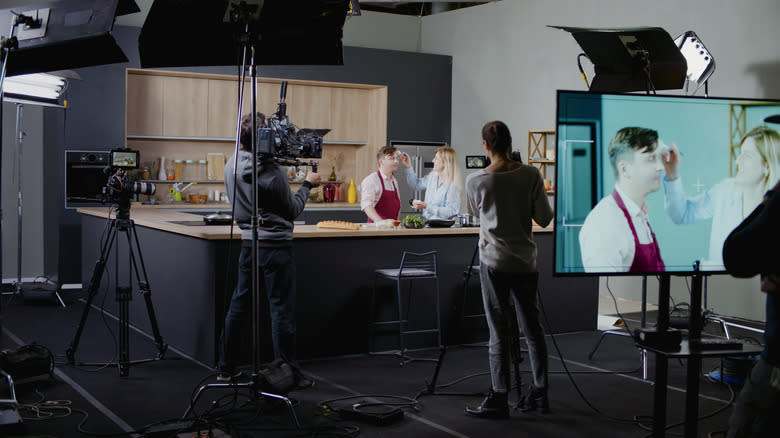
At first glance, seeing a sign-up sheet for lessons with a celebrity chef might seem like a ticket into the lives of the rich and famous through the senses. Who wouldn't want to take lessons from seasoned pros on The Food Network or, better yet, learn the secrets from "Top Chef" contestants who went on to foodie fortune with their own restaurants? Everyone starts somewhere, after all, and a cooking class with the celebrity chef might be your golden ticket to become the next Anthony Bourdain.
But before signing that dotted line, keep in mind that a celebrity's cooking class might be more than you can chew. Anthony Bourdain had mixed feelings about cooking competition shows in which T.V. personalities cut their teeth by standing out. Bourdain cautions that some chefs are more interested in television fame than slaving in front of a stove, and that's a problem. Being a character might draw eyes for the ratings sweeps, but being dramatic won't necessarily improve your cooking skills. If a celebrity chef is performing before the cameras, make sure you're comfortable -- especially if they're renowned for being sassy or overly critical with contestants.
Cooking is part performance and part presentation, and 100% art. Chefs -- celebrity or not -- are always looking for greater exposure. Look over the class's consent forms to know how your likeness can appear in social media accounts or ads.
Clarify Allergies And Dietary Restrictions
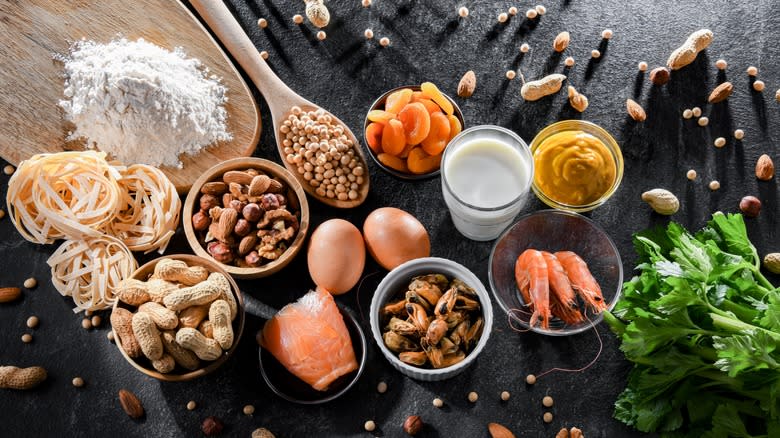
Any cooking instructor is thrilled to expand your palette. But before you register for any particular class, double-check to make sure that the class fits your nutritional needs. Your instructors don't know you personally, and they typically trust you to step in if you have any special dietary requirements.
Many instructors will probably be familiar with the most common food allergies and intolerances in adults. However, rises in food allergy rates are due to lesser-known factors, like making sure kitchen equipment is thoroughly clean to remove all food particles or late on-set diagnoses of certain allergens. Nobody knows you as you do, so be sure to speak up if you're not sure if the class uses certain ingredients or practice hygiene that might trigger a reaction.
If the instructors know of your allergies or intolerances, they can take steps to make sure you get the full enjoyment out of class while staying healthy. Gluten-free and dairy-free substitutes, including swapping traditional baking flour with banana flour, are easy and nutritious fixes for prepping allergy-friendly meals for any occasion. Forewarned is forearmed or, in this case, foregrounded in culinary tricks of the trade.
Learn About Food Trends
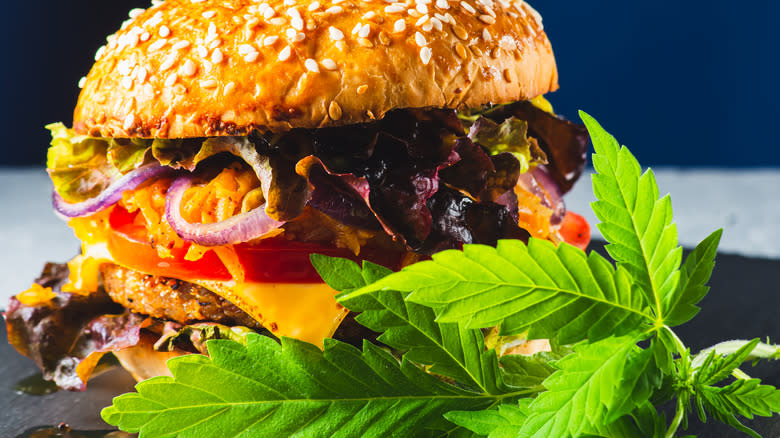
Back in the 20th century, it would have been nearly unthinkable to consider mixing cannabis in your coffee. But times have changed and, in the United States, cannabis-infused foods use the marijuana plant in a variety of forms: powdered, distilled, and extracted. Some cooking institutions have embraced cannabis, and the American Culinary Federation even offers a certificate program in food and drink prep with cannabidiol ingredients.
If you're on board for a cannabis cooking program, you'll have an abundance of choices to pick from. If you're uncomfortable with cannabis, you're certainly not alone. Instructors can verify if any cannabis, hemp, or other terpene plants are part of the menu. If they are, the instructor might have substitute ingredients in the same vein that mocktails can use magic ingredients to simulate the taste and texture of alcohol but lack any actual liquor.
But do keep in mind that in many non-Western cultures, hemp has been part of dishes for centuries. If you are looking for an authentic food experience, traces of cannabis might be found in certain recipes. When in doubt, double-check with the class and be aware of what you're eating.
Treat Foods With Sensitivity
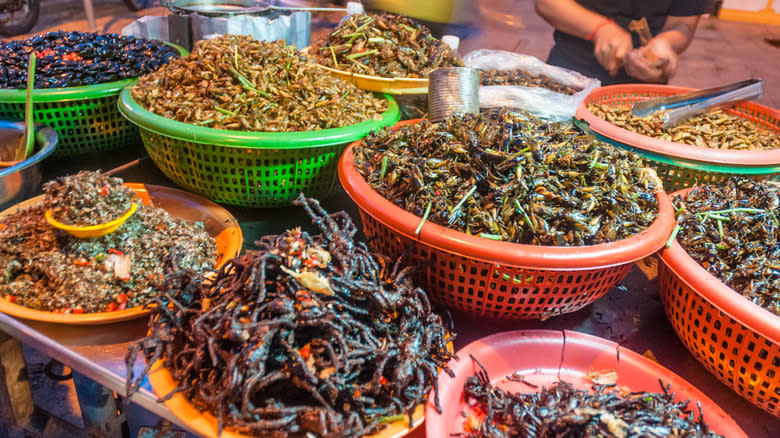
Food makes the world go round, and many cultures base their nutritional standards on vegetables, fruits, and grains. But each culture also has its own standards of taste, and before embarking on a class of world delicacies, study the menu so that you'll be ready for dishes that might be outside your comfort zone.
Bear in mind that everyone's taste buds are different. Growing food trends in the United States like entomophagy -– eating insects -– might look a little off-putting to many Westerners, but bugs are becoming more accepted worldwide as part of a healthy diet. It's not just insects, either. One survey noted that in the United States, some foods that have long been considered luxurious can be met with hesitancy, including escargot and blood sausage. Don't be afraid to dive in. But if you think the class's course is a bit too adventurous for you, then maybe trust your gut and move to the next one.
Be Certain You Can Get Ingredients

One of the joys of a cooking class is that first tingle in your taste buds when a new flavor hits hard. Coming across unfamiliar ingredients can lead to a lifelong love affair with original and fresh ingredients rather than settling for cheaper imitations or artificial versions. When it comes to specialized (and pricey) ingredients, some are worth the time and effort to track them down.
An introduction to world cuisine can whet the palette for more, but reality can be a major stumbling block. Not everyone lives in a bustling city teeming with global food cultures. If you loved your Southeast Asian cooking class, but have trouble finding the right blend of sweet and spicy fish sauces in your local markets, you can try to make your own. But for those special varieties that require months-long fermentation, a lingering pungent fish aroma might be more than what you had in mind.
One option is to ask your cooking instructor for substitutes to replace any hard-to-find ingredients. Or, you might consider skipping specialized, elusive ingredients altogether. Whether swapping or skipping, you might not be able to recapture that exact taste, but part of the art of cooking is improvising and customizing your dishes as needed. And experimenting can up the flavor to an unexpected level.
Don't Be Bored

Sometimes, a cooking class can spark interest by promising a specific recipe or to cook like the pros in professional kitchens. If you're prepping for the holidays or for a special occasion, learning how to make a signature cocktail might be that special something to jazz up the evening and impress your guests.
But before filling out the application, take the time to pursue the rest of the program besides that one dish. If you're just aiming to learn a new trick to fluff up your scrambled eggs in two easy steps and have little interest in anything else, you might be bored. In that case, you're probably better off looking through a cookbook or a recipe database than investing in a ten-week course. In other words, make sure that you're comfortable with the dishes and any food themes that tie the course together. If you find yourself losing interest after the first two weeks, this class might not be for you.
Verify The Skill Level
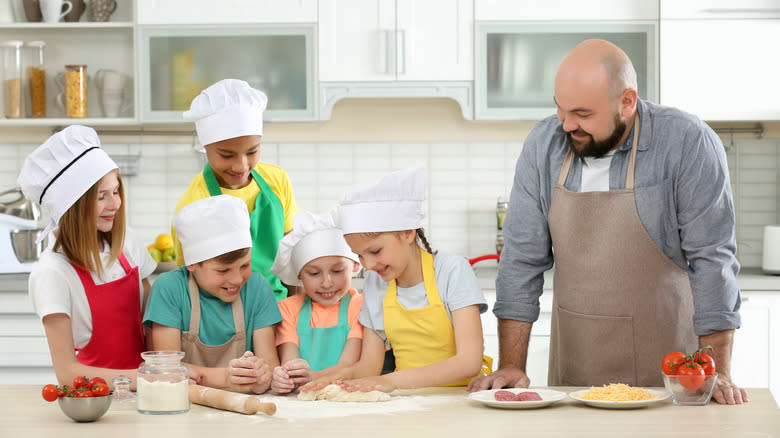
When you hear that your favorite chef is hosting a food class at a local restaurant, it might look like a match made in the kitchen. But when you get there, you find out that the class is for kids 10 and under, or that the class is only for aspiring Michelin-star chefs who want to hone their skills. Here's where the fine print strikes: The class might have two weeks devoted to Boiling Water 101 or imparting advice on how to avoid common cooking mistakes.
Here's where students need to swap their chef's hat and don their gaming gear. Check the class's skill settings before entering. If the entire program is available, look over the first introductory lesson and make sure that it's not too advanced or beneath you.
That's not to say that you should automatically curb your enthusiasm if the cooking class's skill levels don't match yours. Sometimes, it's good to step outside our comfort zone and take a cooking lesson that forces you to confront your fears. Your instructors want you to succeed, and most are more than ready to step in if you need an extra hand when learning a skill for the first time.
Check Out The Classroom Technology

Lest any doubt remains that cooking is an art, consider the humble coffee bean. A coffee connoisseur can prepare a classic brew by splurging on the latest high-tech coffee aid dispenser or grind their own beans the old-fashioned way without a grinder. If you're taking a demo on demitasses, you might be bombarded with a menagerie of strategies to get that perfect cup of joe.
The same goes for any cooking class. The digital revolution has liberated cooks from slaving over the stove. But not every baker will have (or want) a high-tech scale with blue tooth capability, while tech-heads might be hesitant with prepping recipes that require rolling and mixing regiments that seem like a bicep workout. In short, check out the classroom's level of technology. If you're a DIY chef who regards an overflow of countertop gadgets as too many cooks crowding the kitchen, a low-tech, low-budget course might be perfect. If you're the type who wants every smart device, including the kitchen sink, a tech-immersive workshop might be more mise en place.
Confirm Logistical Needs
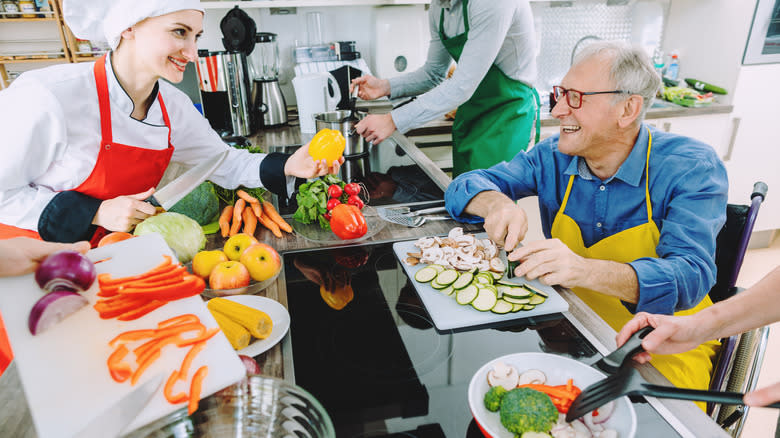
Navigating around your kitchen is like second nature. We know how to arrange our pots and pans so they don't tumble out the cabinets, and we know how to avoid stubbing our toe when maneuvering a casserole dish around the corner. Arranging our kitchens to suit our lifestyles is a must, but even then, accidents happen. When working in an unfamiliar cooking space, we need to double down in looking out for our safety.
If you have a disability -- from working with your fingers to moving about the kitchen in a wheelchair -- make sure the class can accommodate you. Professional cooking schools and restaurants are already required to comply with the American Disabilities Act for staff and instructors, and your class might have some extra wiggle room when the sink and counter get crowded. Some classes might also provide non-slip mats and grip surfaces, ergonomic knives and peelers, and digital scales with large screens to accommodate elderly or audio/visually impaired students. But it doesn't hurt -- and you can save on future hurts -- to let the instructor ahead of time if you have trouble reaching out or if you need to bring in any specialized equipment to ace your class.
Keep An Open Mind
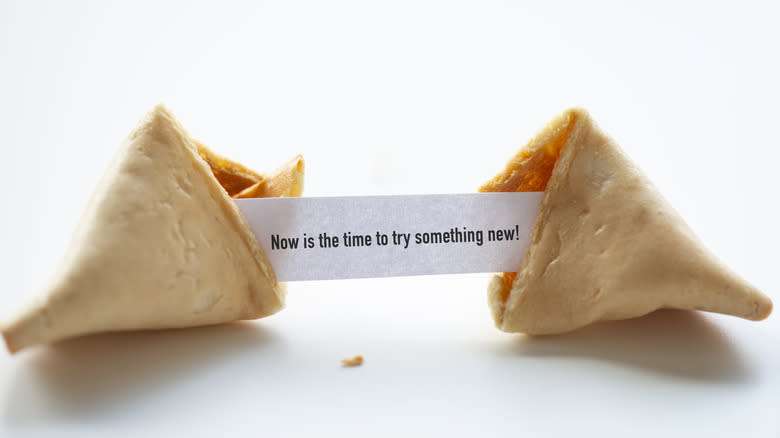
Actor Nicholas Hault might have said it best. Hault mused, "Do it with people who know what they're doing." Truer words were never spoken when Hault learned that one hated dish -- Brussels sprouts -- could become a favorite when prepared a different way. Thus is it with any yucky veggie from our finicky childhoods that can become our new favorites when done a new way. Not only do you get to taste awesome dishes, you learn about where food comes from and how what we put in our plates is connected to who we are and what we do.
And, yes, do it with the experts. Chefs are artists with their craft. You might not like one dish or ingredient, but trying new things can open new doors and new culinary desires. Part of going to a cooking school is to learn new techniques, try new foods, and even come away with a better understanding of world cuisine and the role that all food varieties play in our society.
Read the original article on Tasting Table.

